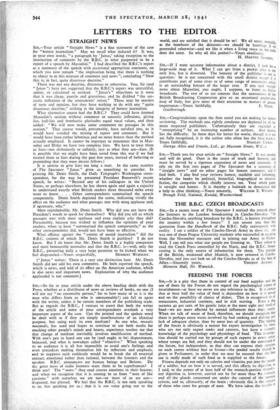LETTERS TO THE EDITOR
STRAIGHT NEWS
SIR,—Your article " Straight News " is a fine statement of the case for "honest journalism." May we recall what induced it? It was, in your own words, " a paragraph by ' Janus,' taking exception to the interjection of comment by the B.B.C. in what purported to be a report of a speech by Mussolini." I had described the B.B.C.'s report as a summary of the speech with occasional appropriate comment, on which you now remark " the implication being that there is nothing to object to in this mixture of comment and news "; concluding "Now this is, in fact, quite disastrous doctrine."
There was not any doctrine, disastrous or otherwise. You, Sir (and " Janus ") have not suggested that the B.B.C.'s report was untruthful, unfair, or calculated to mislead. " Janus's " objections to it were that it was cheap, puerile and gratuitous; and he disliked " the sar- castic inflexions of the announcers' voices." Those may be matters of taste and opinion, but they have nothing to do with any " quite disastrous doctrine," striking at the integrity of honest journalism.
What alternative course had the B.B.C.? They could have intoned Mussolini's oration without comment or sarcastic inflexions, giving lies, half-lies and bombastic platitudes equal vocal values, and then added: " We will now make some comments on passages in this oration." That course would, presumably, have satisfied you, as it would have avoided the mixing of report and comment. But it would have been rather laborious and no more honest than the method actually employed. It cannot be improper to remember that in Mus- solini and Hitler we have two complete liars. We have to treat them as liars—not dishonestly or unfairly; just as what they are—liars. (It is possible that we might have been saved from this war if we had treated them as liars during the past few years, instead of believing or pretending that they were decent fellows.)
It is unwise to give liars too long a start. In the same number of The Spectator " Janus " gives us something to consider. In praising Mr. Denis Smith, the Daily Telegraph's Washington corre- spondent, for the way he presented President Roosevelt's recent speech, he writes: "Beyond any of his colleagues in the United States, or perhaps elsewhere, he has shown again and again a capacity to understand exactly what British readers three thousand miles away want to know. . . . Other correspondents summarised the speech competently. Denis Smith depicted the scene, indicating vividly the effect on the audience and what passages met with most applause and, if necessary, why."
Most reprehensible, Mr. Denis Smith. Why did you not leave the President's words to speak for themselves? Why did you tell us which passages met with most applause and even explain why they did? Presumably, because you wished to influence the opinions of your readers, when to have " summarised the speech competently," as the other correspondents did, would not have been so effective.
What offence against the " canons of sound journalism " did the B.B.C. commit of which Mr. Denis Smith is guiltless? I do not know. But I do know that Mr. Denis Smith is a highly competent and most honourable journalist and that the B.B.C. is—well, only the B.B.C., presenting daily a very large posterior to be kicked when we
feel disgruntled.—Yours respectfully, HERBERT WORSLEY.
1" Janus " writes: There is a very real distinction here. Mr. Denis Smith did not add his own comments. He both reported the speech, which is news, and told of its effect on the American audience, which is also news and important news. Explanation of why the audience applauded is not comment.]






























 Previous page
Previous page